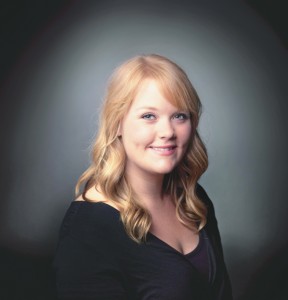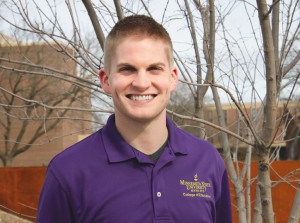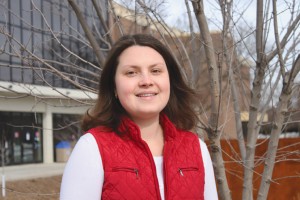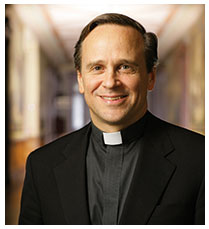Originally posted May 15th, 2014 on the Minnesota State University Mankato TODAY Magazine
By Carol Jones

Kady Johnson ’13 MA remembers crying the day she was accepted to college. She cried because she hadn’t expected it to be an option for her—and because she didn’t think that she would be able to pay for it.
Johnson grew up in a home with limited financial resources. She had no expectation of being able to go to college, but she applied anyway. So when an acceptance letter arrived, she wept. “That was a defining moment in my life,” she says.
A scholarship from the Annexstad Family Foundation made it possible for Johnson to attend college—and now, as a program administrator for that same foundation, Johnson helps other students in similar situations realize their dreams. She sees first-hand the impact scholarships have on students.
Like Sierra Fedder, who received one of the two Leaders of Tomorrow scholarships given by the Annexstad Family Foundation to Minnesota State Mankato students this year. For Fedder, receiving the scholarship meant that she didn’t have to rely on loans and work multiple jobs. “It’s super helpful,” she says.
The funding for two annual Leaders of Tomorrow scholarships, as well as an annual Big Brother Big Sister scholarship, came from alumnus Al Annexstad ’67 and his wife Cathy as part of the recently completed Big Ideas Campaign. Almost one-third of the $77.8 million raised during that campaign—$22, 936,752.56—went to scholarships. And those scholarships are having an immediate impact on students at Minnesota State Mankato.
“Seeing the cost of college for the first time can be a real shock to a student and can be overwhelming to a family; it was to mine. Like me, many could not attend without scholarships,” says Johnson.
As she sees scholarships being awarded, Johnson watches the transformative effect they have on students. “It is amazing. Students make an emotional connection to what the scholarship means,” she says. “We hear repeatedly how scholarships help them fulfill their dreams.”
Raising the Bar
The nation-wide funding shift in higher education continues to increase the financial burden on students and creates barriers to post-secondary education. “The high cost of college education can lead to access problems—kids either can’t afford college or students take on all sorts of debt,” says Kent Clark, vice president for university advancement at Minnesota State Mankato.
The average loan debt of Minnesota State Mankato graduates is nearly $30,000.
In addition to providing greater access to higher education, Clark says that privately funded scholarships impact the University in another way. “As we continue to be the excellent university that we are and really offer the very best education possible, we find ourselves in a competitive marketplace for students. Nothing enhances our ability to compete for great students like scholarship dollars,” he says.
“You can almost go department to department—the more scholarships they have, the higher level of performance you will see from students both while on campus and after graduation,” says Walter Zakahi, dean of the College of Arts and Humanities. For example, the Department of Theatre and Dance gives 45 scholarships per year; several are first-year talent grants. The impact of that is pretty direct.
“We have a talent depth that wouldn’t be there without the scholarships,” Zakahi says. “Our program is recognized nationally for its excellence and locally, audience members enjoy a level of theatre and dance that is really unprecedented in a university setting.”
A strong scholarship program attracts talented students; those students elevate the performance of other students, push faculty and contribute to the community as actors, singers, dancers, writers and artists. After graduation, they go on to perform on Broadway, pen national bestsellers and serve as leaders of businesses and organizations.
“I cannot tell you whether or not these students would have gotten a college education without the scholarships or whether they would have come to Minnesota State Mankato,” says Zakahi. “However, I can tell you that we compete on a much higher level when we have the scholarships than when we don’t.”
Making an Impact
Providing a scholarship is often very personal to the donors as well. Al and Cathy Annexstad, for example, launched the Annexstad Family Foundation in 2000 to help students who, like Al, faced financial hardships or who were involved in Big Brothers Big Sisters, an organization that they support. Although they are particularly proud to fund scholarships at Minnesota State Mankato because of their personal ties to the University, they provide others at institutions around the country as well.
“Donors have the desire and the means to make a big impact,” says Johnson. “And they recognize that, for some students, a college education can be a ticket out of a difficult situation, whether it is poverty, social oppression or being first in your family to attend.”
Like most donors, the Annexstad Family Foundation has a vision for how its scholarship dollars will be distributed. “The majority of Mankato’s scholarship dollars are donor directed. They reflect the experiences and values of donors,” says Jeff Halbur, senior director of development and planned giving. “Donors may have an emotional connection to and/or an appreciation for the profession, academic program, the University or the financial need of the student. Many employ a ‘pay it forward’ approach.”
“Some of the most passionate donors are people who speak or think often about the direction of the country,” adds Clark.
Johnson agrees. She sees donors who are uniquely aware of the global impact scholarships can make locally. “They understand the special needs of students. They recognize the potential of students and the need for support,” she says. “Scholarships help secure the next generation and the next great minds.”
“Few things give people the opportunity to have a direct impact on what is going to happen in their community for generations to come,” adds Clark. “You make an endowed scholarship gift and you are going to have a direct, tangible effect in perpetuity—that is quite powerful.”
“Scholarships help secure the next generation and the next great minds.” —Kady Johnson

Philip Munkvold
College of Education Dean’s Scholarship
Philip Munkvold doesn’t remember a time when he didn’t want to be an educator. The dedication and commitment of his second grade teacher, Mrs. B., made a profound impression on him, especially because she went out of her way to help him as he underwent chemotherapy to fight leukemia.
“I chose to enter the field of education because I have had some really remarkable teachers growing up, and they became a catalyst for many of the decisions I have made throughout my life,” he says. “I owe a special thanks to my second grade teacher, who proved to me that teaching does not belong just in a classroom.”
Even as a student, Munkvold’s focus extends beyond the classroom and his course requirements. He sings in three choirs, volunteers with Colleges Against Cancer and the Children’s Miracle Network, and has held leadership positions in Mankato’s Elementary Education Club.
That community work, combined with Munkvold’s leadership skills, helped him earn the 2013-2014 College of Education Dean’s Scholarship, which has reduced his financial stress and allowed him to focus on his education.
Rather than heading off to another job after a day of student teaching in the St. Peter Public School District, Munkvold is able to take the time he needs to reflect, research and plan effective lessons for the next day. “I have time to think about what went well and what I could do better,” he says. “As a result, I think my students get better lessons and when I graduate, I will have more to contribute as a licensed teacher.”
Every day, Munkvold aspires to be like Mrs. B. “I hope to make an impact on my students that is just as profound as the impact left on me,” he says.

Tatiana Soboleva
Winston Grundmeier Chemistry Scholarship
Gladys Olson/Bill Olszewski Scholarship
Tatiana Soboleva grew up in the Eastern European country of Moldova. Extremely bright, hardworking and passionate about science, Soboleva yearned for a challenge but found limited educational opportunities at home. As she explored various options, a family friend told her about the quality of education in Minnesota.
She immediately applied to Minnesota State Mankato. When she received her acceptance letter, Soboleva also received an international student scholarship that helped affirm her decision to come to Mankato.
Although she misses her family and friends back home, her introductory science courses made the decision worthwhile. “I had the most amazing biology and chemistry courses,” Soboleva says. “I switched my major to biochemistry. I want to understand biology—the study of the human body and cells—for chemical applications.”
Now, as a senior, Soboleva’s hard work and dedication have earned her a pair of scholarships: the Gladys Olson/Bill Olszewski Scholarship from the International Student Endowment Fund and the Winston Grundmeier Chemistry Scholarship.
Those scholarships make it possible for Soboleva to devote her time to what she is most passionate about: research. She is currently involved in four research projects: a study of the genetic mutations of fruit flies; an egg white purification project; an analysis of archival French paternity suit documents that allows her to put her nine years of studying French to use; and using electro-paramagnetic resonance to study the oxidative effects on muscle protein function, under the direction of a new faculty member, Rebecca Moen. “I was so interested in this kind of biophysics research, I begged to join Dr. Moen’s research before she came to Mankato,” Soboleva says.
Her experience on different research teams helps Soboleva develop ideas for her future. “At a recent conference, collaboration among groups was a big topic. Collaboration allows growth. One day my goal is to help international science communities grow through collaborative, applied research,” she says. “We can unite resources and show real results.”

Sierra Fedder
Leaders for Tomorrow Scholarship
Not long after graduating from Mankato West High School, Sierra Fedder got a call from the Upward Bound counselor she had worked with for several years. “He asked if it was okay for him to recommend me for a scholarship,” Fedder says.
The scholarship that counselor recommended was the Leaders for Tomorrow scholarship from the Annexstad Family Foundation, which is awarded to two students with both financial need and demonstrated potential for leadership at several select universities around the country—including Minnesota State Mankato.
Receiving the scholarship allowed Fedder to start planning for her future. Now she knows that she’ll be financially able to finish her degree at Minnesota State Mankato, and even though she hasn’t officially declared a major yet, she knows what her ultimate goal is.
“I know that I want to help people,” she says. “I don’t know exactly how yet, but I know that’s what I want to do.”


